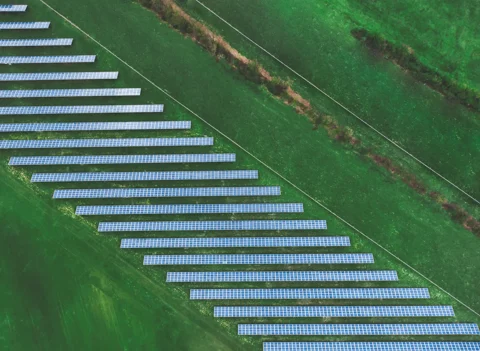Despite the corona crisis, the investment year 2020 was not bad for APG. However, the outlook for 2021 is uncertain. With booming financial markets, increasing inflation risk and worry about the speed of the vaccine roll out. What does this mean for APGs investments? Peter Branner, Chief Investment Officer of APG Asset Management, looks back and takes a bird's-eye view ahead on the basis of ten themes.
2020
"Despite all the turmoil, we've had a very decent year in terms of both absolute and relative investment results. Our pension fund clients achieved a return of around 7% in 2020, which is in line with our average over recent years. After the severe price falls in March, stock prices rose sharply before the summer and continued to the end of the year. For our two largest clients, ABP and BpfBOUW, we achieved an average additional return compared to the market of 0,90% due to broad range of active management decisions in several sub asset classes within both fixed income and equity."
Central banks 2021
“The 2021 investment year will be largely determined by the way central banks are going to balance their strong support to financial markets with ultra low interest rates and buying up financial assets, thereby justifying the low risk premia investors accept. I expect this support to continue and it will be the single most important area to follow closely. Any changes in actions - or even rhetoric - could be very bad news for financial markets. The better news is that central banks are rational institutions – they also look at growth, inflation and unemployment. The question is how soon the economy will recover and how elegantly the central banks will be able to unwind the support without jeopardizing financial market.”
Corona crisis
"The media continues to drive a lot of attention to the implications of the lockdown and the delay in vaccination of the population. Listening to the experts I sense that the virus and the mutants can be around for longer than we all hope. The economic impact will be challenging for many sectors and at the same time provide growth for others. Active management of assets will be important in this climate."
Consumer behavior
"For the Netherlands, I don't see consumer spending rising much in the first six months. As long as the uncertainty about employment is high this will have a dampening effect on consumption. At the same time the attribution of consumption is important to follow and what people save on travel they probably will continue to spend on house improvements, electronic equipment and similar stuff.
It's also somewhat questionable whether we'll pick up our old life again, so work full-time in the office, fly a lot, you name it. At the same time, policymakers will use fiscal policy to stimulate specific consumer behavior. Examples include taxes on polluting , such as air passenger tax, but also the coming CO2 levy for businesses. For the time being, consumers will remain very uncertain about the economy, their purchasing power, and how to keep their jobs. We see this uncertainty reflected in the financial markets, especially in the VIX, the indicator of investor unrest. The VIX peaked at more than 80 last year and has now settled at a somewhat elevated level around 20 due to fear, but probably also some speculative market participants. Still higher than longer term average and I can see that going on for a while."
Financial policy support
"Policymakers in both the US and the eurozone have set up massive fiscal stimulus programs over the past year. This is good news and could work very well but it is complex to implement unlike interest rate stimulus from central banks that is much more simple and proven concept with immediate impact. Financial policy support will pick up in 2021 and what we will follow closely is how the actual allocation of support is going to practically handled, be absorbed in the economy and showing effect. This is not trivial, it will take time and maybe requires another type of politician like Mario Draghi to succeed. For Italy specifically, this is going to be crucial."
Joe Biden
"The election of Joe Biden as the new president has far-reaching consequences. For the global approach to the climate problem in any case, it's good that Biden immediately ensured that the US rejoined the Paris Climate Agreement. The world's largest economy has a major influence on the pace of the necessary sustainability movement. I also assume that trade relations between the US and the EU countries will improve with positive effect on some parts of the economy even if there are still important bottlenecks in relationship to how we tax tech giants in Europe. Biden might provide more fiscally stimulating than his predecessor, but let’s not forget that Trump gave huge tax reliefs to the wealthy. Somehow Biden will have to finance the recovery plan so I do expect a tax policy to address social unrest. This is not necessary good news for financial markets in the shorter term, regardless of the sympathy I have for the rationale. I don't see much improvement in the relationship between the US and China. Biden's ideas about the interpretation of the trade relationship with China do not differ much from those of Trump and let’s be realistic. The global encounter for superpower between China and the US has just begun.”
Sectors
"These political and macroeconomic trends obviously have consequences for the sectors in which we invest. I think the tech sector will continue to perform well in 2021, and so will online retailers. This is not a revolutionary view. The consensus is that physical stores, shopping centers, but also businesses in the travel industry, will have tougher times in 2021. As a diversified investor, these trends were already part of our investment process before the pandemic. In practice, this means that our different investment teams have a risk/return view on both companies and sectors when we build portfolios. Digitalization and robotization are also a theme under which we select our investments. With our broad mandates this allows us to invest in the most lucrative parts of value chains as well as the most interesting part of the capital structure."
Fossil fuels
"We've been in dialog with the oil and gas companies we invest in for years now. As a committed shareholder, you can influence these companies to make the transition towards generating sustainable energy, so that their CO2 emissions are reduced. We should invest in companies that best implement this transition; who have successfully switched from the extraction of energy from oil and gas, to wind farms at sea and solar energy."
Emerging markets
"The corona pandemic has resulted in negative growth figures in most countries worldwide. Except in China and some emerging markets, especially in Africa. For the long term, I do regard the advancing robotization in Western countries as a risk for Emerging markets. We have also seen fright rates sky rocket in the last year. These dynamic factors together with the focus on climate will change the emerging market story gradually as these fragile economies will have to rely more on inland consumption. This will work out in China, less so elsewhere. And we might need to reclassify our mindset about China as an emerging economy. In many ways China has surpassed Europe and the US in its way of using modern technology."
Infrastructure
"In addition to investing in shares, bonds and real estate, we invest directly in infrastructure. Examples include wind farms, ports, airports, highways, bridges and toll roads. These investments make a stabilizing positive contribution to our returns and contribute to the energy transition. These are often complex investments and therefore deselected by most other investors – benefit being that we get a slightly higher return. Worldwide, investment in infrastructure is going to pick up strongly, partly due to all the stimulus measures from governments. I don’t expect us to 'compete' with public money in interesting infrastructure investment projects. Rather I expect some government money to find comfort in investing together with us due to the know-how we have built to facilitate complex investment analysis, partnerships and platform investments (investments where we gradually can expand our interest).”
Bitcoin
"Yes, bitcoin is the current hype for some more speculative money, digital front runners such as Elon Musk and now also some of the larger transaction banks. I admire the blockchain technology behind Bitcoin but I worry about the actual value of Bitcoins. I don’t see it as a new asset class but I do see the massive energy consumption it took to “mine” the digital currency. I also struggle with the fact that Bitcoins are not backed by central banks. Central bank backed digital currency is being rolled out and this I would support big time. In a country like Sweden tax fraud has become much harder as they see the use of physical notes and coins diminishing. Central bank backed digital currency is hopefully the future in all countries. But not bitcoins.”



